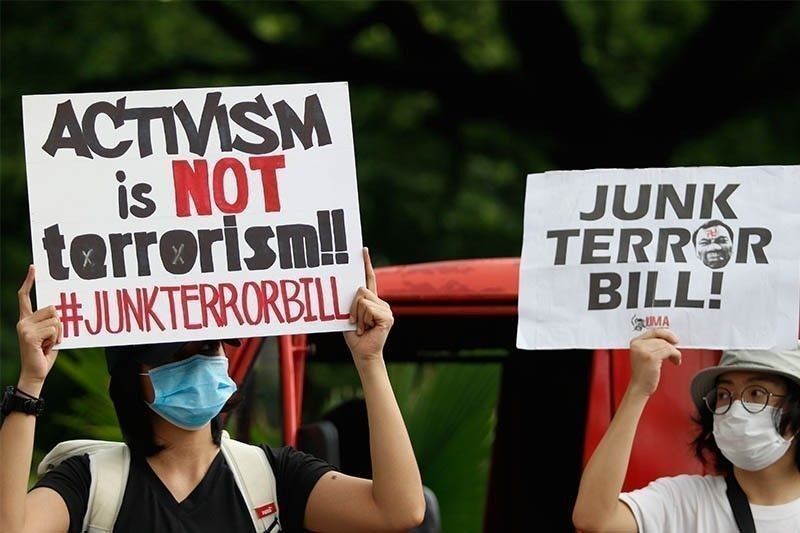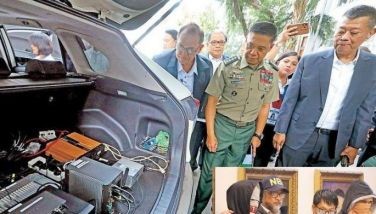6 UN experts sound alarm over Philippine government’s ‘unchecked’ anti-terror powers

MANILA, Philippines — Six independent United Nations human rights experts have flagged the Philippine government’s “seemingly broad and unchecked” use of the anti-terrorism law to target red-tagged humanitarian workers and church leaders.
United Nations special rapporteurs publicized this month their October 10 letter to President Ferdinand Marcos Jr. detailing cases of red-tagging, judicial harassment and targeted financial sanctions against religious groups and activists “in the name of countering terrorism and terrorist financing.”
The UN experts counted at least 24 alleged victims of rights violations from the government’s counter-terrorism efforts from 2019 to 2023 — which covers the second half of the Duterte administration and Marcos’ first year in office.
The letter was publicized last week by the UN experts, led by UN Special Rapporteur on Human Rights while Countering Terrorism Fionnuala Ni Aoilain, after the Marcos administration reportedly failed to respond to their communications within 60 days.
The UN experts noted an “observable trend” where Philippine authorities would accuse church members engaged in development and humanitarian work of membership with the Communist Party of the Philippines - New People’s Army (CPP-NPA) — a group that the government has designated as terrorists.
The UN special rapporteurs also raised concerns over the broad range of counter-terrorism powers bestowed upon the Anti-Terrorism Council and the Anti-Money Laundering Council, which have been wielded in a “broad and arbitrary manner against non-profit organisations and individuals.”
“We have received information that multiple religious organisations and their members, as well as other direct service non-profit organisations have been affected by the alleged measures, in turn hindering access to indigenous peoples, internally displaced persons, human rights defenders, and women and children to critical human rights and humanitarian services,” the UN experts wrote.
This, according to the rights experts, goes against the Philippines’ international human rights obligations, which the government has repeatedly and publicly vowed to uphold.
The UN experts also warned against “the significant downstream harms” of imposing financial sanctions against persons accused of terrorism, which can hurt the “future financial and reputational viability of the impacted organizations.”
They said that any process involving the listing of individuals or freezing of assets related to terrorism should adhere to due process, including ensuring a person's right to a fair trial, the presumption of innocence, the right to appeal, and a right to effective protection by the courts.
The UN rights experts also flagged the reported raids of the homes of human rights defenders and the offices of church workers and journalists, some of which were not preceded by the issuance of formal search warrants.
“We are further concerned by the alleged raid targeting members of KARAPATAN, who were seeking refuge from the church, and the consequences of such a raid on the enjoyment of the rights to peaceful assembly and association and the other fundamental freedoms and protections due to human rights defenders,” the letter added.
Even as the government is in the process of restarting peace talks with the National Democratic Front (NDF) — the negotiating arm of the CPP-NPA – the justice department has maintained that it will continue to prosecute acts that will violate the country’s anti-terrorism law.
“If they come forward and represent themselves in good faith and yet still continue activities that will fall under the Anti-Terrorism Act 2020, then they can also be prosecuted,” Department of Justice Spokesperson Mico Clavano said in a January 11 briefing.
The Marcos administration’s amnesty program for former rebels and the anti-terrorism law are also “two different animals,” said Associate Solicitor James Clifford Santos from the Office of the Solicitor General.
The Supreme Court’s procedural rules for petitions seeking judicial relief from the Anti-Terrorism Council’s terrorist designation took effect on January 15.
Prior to its passage in 2020, the Anti-Terrorism Act was widely opposed by human rights defenders, civil society and the government’s own human rights commission for its perceived impact on civil liberties and spaces of dissent.
Most critics of the measure flagged the law's loose definition of terrorism, which raised concerns that lawful expressions of opposition and peaceful dissent could be unjustly labeled as terrorist activities.
- Latest
- Trending





























